Ph.D Neuroscience Latest Updates
23 Jan, 2026 GPAT 2026 registration is open till 12 January 2026. The exam will be held on 7 March 2026. Check Here
PhD Neuroscience is a research-level program which is of duration 3 to 5 years. This course acquaints candidates with the different aspects of the nervous system, blending it with the discipline of neurology.
Check: Top PhD Neuroscience Colleges in India here.
This program offers candidates an integrated view of neuroscience combining it with the intricacies of research.
To be eligible to apply to this course, students must hold an MSc or MPhil degree in a relevant discipline from a recognized university with an aggregate of at least 55% marks.
Admission to this program will be done based on the candidate's performance in the entrance exam which is followed by a personal interview round conducted by the college or university. However, there are some institutes that offer admission to this program based on merit in the Master’s degree exam. The average tuition fees for PhD in Neuroscience courses in Indian colleges usually range between INR 15,000 and INR 3,20,000 per annum.
On completion of a Ph.D. Neuroscience courses, students have many job opportunities in India as well as abroad. Students will be able to find work as Neural Engineers, Computational Neuroscientist, Biotechnologist, Database and Databank Managers etc. in the areas like Genetic Counselling Centres, Psychology Centres, Pharmaceutical Companies, Forensic Science Labs etc.
Table of Content
2.1 Why Study?
3.2 Entrance Exams
3.3 How to get admission to a good PhD Neuroscience college?
6.1 Future Scopes
The average salary offered to PhD Neuroscience degree holders is around INR 3,00,000 to INR 7,00,000, but this can be higher on the basis of experience and other factors.
If students wish to do further research, they can become independent researchers and publish their research papers. They can also earn a DSc (Doctor of Science) degree in the related domain in future.
PhD Neuroscience Course Highlights
Highlights for PhD Neuroscience program are provided in the table given below:
| Duration | 3 to 5 years |
| Eligibility | Master’s degree in relevant discipline from a recognized university |
| Admission Process | Merit/ Entrance-Based + Personal Interview |
| Average Annual Fees | INR 15,000 to 3,20,000 |
| Job Positions | Neural Engineer, Computational Neuroscientist, Biotechnologist, Database and Databank Manager etc. |
| Top Recruiting Areas | Genetic Counselling Centres, Psychology Centres, Pharmaceutical Companies, Forensic Science Labs etc. |
| Average Annual Salary | INR 3,00,000 to 7,00,000 |
PhD Neuroscience: What is it about?
Information and details about the PhD Neuroscience program are as follows.
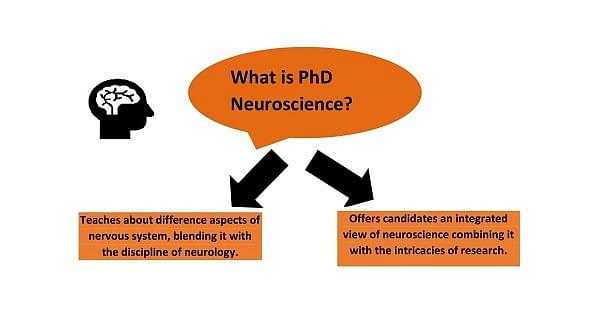
- The field of Neuroscience integrates the study of aspects related to Neurology and its other disciplines.
- This course explores the field of biology which is a combination of life sciences, ancillary, Biochemistry and Health Sciences.
- Doctorate in Neuroscience enables candidates to gain proficiency in polishing their skills of communication, analysis and diagnosis of serious ailments.
- The program covers the aspects of Neuroscience which builds in them the competence to conduct research about the serious ailments, enabling them the ability to work independently, interpret and develop a hypothesis to bring a solution for the ailments.
- In this course, students are imparted the experience of generating reports, enhancing their writing skills, expressing complex ideas with proficiency. They are also skilled in the aspects of recording data, analyzing it, imbibing in them the ability to experience MRI and spectroscopy with the knowledge of experimental designing.
- The course curriculum of this course is designed in a manner to make students competent to dissert information as well as carry on their research work.
- The course prepares candidates to become proficient researchers and neuroscientists with finesse.
Why study PhD Neuroscience?
The goal to attain a PhD in Neuroscience degree will depend on each individual’s aspirations and goals. Some of the benefits and perks of pursuing PhD Neuroscience degree program has been mentioned below:
- Open ways to various professions, and more lucrative positions: There are a large number of positions that require a PhD degree. A PhD may win you more significant compensation, however not be vital. For example, you can be an advisor without a PhD, however it gives you a major favorable position.
- Will boost up your confidence: At the point when you take a shot at your PhD, you'll fundamentally be working alone, settling on your own choices, and wrestling with the results of your work. In an ideal situation, you additionally have a strong tutor and labmates, however this isn't ensured.
- You'll get five years of extraordinary research experience: A little bit of the populace can say that they've worked in a lab by any means, even better for 5.5 years all alone, autonomous undertaking. This experience will give you understanding into the cycle of science and, when done right, open you to important exploration aptitudes for the seat and past.
- On completion of this course, students can easily get an average salary package ranging between INR 3,00,000 and INR 7,00,000 per annum.
- After completing this course, students will be able to find jobs in various sectors such as Genetic Counselling Centres, Psychology Centres, Pharmaceutical Companies, Forensic Science Labs etc.
PhD Neuroscience Admission Process
-
Most of the colleges and universities follow an entrance-based process for admission to PhD Neuroscience courses.
-
On cracking the entrance test, candidate’s research topic, proposal, methodology etc. are checked and an interview is held.

Merit-based admission
- Submit the application to the colleges or universities you are interested in for admission.
- Perform well in the undergraduate examinations as the scores obtained in these form the basis of the entire admission process.
- In due course of time colleges release their cutoff lists. Check if you are eligible for admission into the desired course.
- If eligible, visit the college and submit all the required documents.
Entrance Based Admission
Most of the colleges and universities offer admission to PhD Neuroscience program on the basis of entrance exams like JEST, UGC NET, CSIR NET etc.
The step-by-step procedure for entrance-based admission is as follows:
- Step 1: Students have to register on the official website.
- Step 2: Fill the application form with correct details.
- Step 3: After examination, a cutoff list will be released on the website. Seats will then be allotted to candidates based on their scores in the entrance exam.
- Step 4: Some colleges also conduct personal interviews and group discussion for admission to this course.
- Step 5: On meeting all the eligibility criteria, a student will then be offered admission to the course.
What is the PhD Neuroscience Eligibility Criteria?
The common PhD Neuroscience eligibility criteria that candidates need to fulfil to be considered eligible for admission to this course is as follows:
- Candidates should have completed their M.Sc. in Neuroscience or M.Phil degree in the respective field with a minimum aggregate of 55% and above from a recognized university.
- They should have passed the entrance examination conducted by the university for admission to the program such as PET, JGEEBILS, JEST, NET etc.
Which are the popular PhD Neuroscience Entrance Exams?
There are many national and state-level entrance exams to appear for the admission into PhD Neuroscience program. Listed below are some of these popular PhD Neuroscience entrance exams.
- GATE: GATE is a national-level exam conducted jointly by the Indian Institute of Science and IITs to select candidates for the award of PhD degree jobs or lectureship in Indian universities and colleges.
- UGC NET: The National Testing Agency conducts this exam on behalf of the University Grants Commission. Qualified candidates are granted admission to the various doctorate level courses. This test is also used for deciding the eligibility for JRF or post of Assistant Professor in colleges and universities.
The application dates, exam dates and the mode of the exam of the above mentioned exams are provided in the table below.
| Exam Name | Application Period | Exam Date | Exam Mode |
|---|---|---|---|
| GATE | August 31, 2023 – October 12, 2023 | February 3, 4, 10 and 11, 2024 | Online |
| UGC NET (December Session) | September 30, 2023 – October 31, 2023 | December 06-22, 2023 | Online |
| CSIR NET (December Session) | November 01-30, 2023 | December 26-28, 2023 | Online |
| ICAR AICE JRF/SRF | To be announced |
To be Announced |
Online |
| JNUEE | To be announced | To be announced | Offline |
How to Prepare for a PhD Neuroscience Entrance Exams?
The syllabus for PhD Neuroscience entrance exams will vary from college to college. Some of the important tips that students can follow to excel in entrance exams are given below:
- Go through the detailed syllabus of the written test, start studying them, revise your concepts.
- One important hack to crack entrance exams is to develop a reading habit, be it a newspaper, novel, books, biographies and case studies.
- Time management is one of the most important aspects to crack entrance exams, this is not only applying to the study schedule but attempting the most exam as well.
- Practicing sample papers and mock test papers will assure you of the time management skills by the time your entrance exam starts.
- Practice is the thumb rule for cracking entrance exams. Ensure that your concepts are clear and you are aware of all the right ways to solve questions within the time frame.
- Start learning from the basic step and thereafter move to higher and difficult levels of concepts.
How to get admission to a good PhD Neuroscience college?
To get admission in the top PhD Neuroscience college, the following points must be kept in mind:
- Candidates are shortlisted by the college through respective entrance exams followed by an interview.
- To get a good college for PhD Neuroscience, appearing for the UGC NET exam is the best way and for some of the colleges’ UGC NET is also considered good to approach.
- A few private institutes are there offering the course to admit students based on their performance in a relevant entrance test followed by a round of Personal Interview.
- Getting into a good college for the admission in PhD Neuroscience program, candidates need to score well in the respective entrance exams.
- Candidates should put their time and effort into the entrance test as well as be prepared for a personal interview round.
- They should be well versed with their research topic so that they can impress the interview panel with their research idea.
Which are the top PhD Neuroscience Colleges?
The table below shows the best PhD Neuroscience colleges and universities that offer the course in a full-time mode.
| NIRF Overall Ranking | Name of the College/ University | Admission Process | Average Annual Fees | Average Annual Salary |
|---|---|---|---|---|
| 2 | IISc, Bangalore | Entrance-Exam followed by Interview | INR 35,200 | INR 7,00,000 |
| 11 | University of Calcutta, Kolkata | Entrance-Exam followed by Interview | INR 47,800 | INR 6,54,000 |
| 14 | MAHE, Manipal | Entrance-Exam followed by Interview | INR 59,000 | INR 5,25,000 |
| 63 | Amity University, Noida | Entrance-Exam followed by Interview | INR 1,00,000 | INR 4,50,000 |
| -- | OPJS University, Churu | Merit-Based | INR 85,000 | INR 5,26,000 |
| -- | SRHU, Dehradun | Merit-Based | INR 90,000 | INR 6,78,000 |
| -- | Era University, Lucknow | Entrance exam followed by Interview | INR 50,000 | INR 6,57,000 |
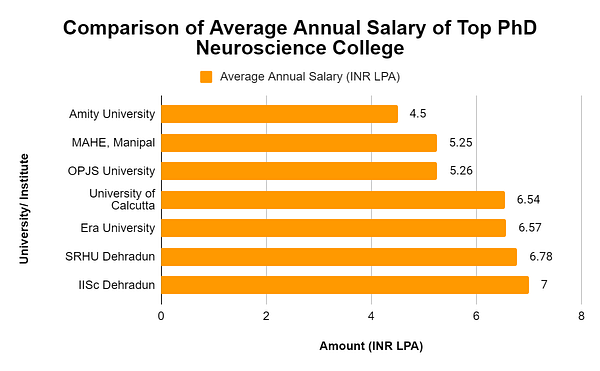
PhD Neuroscience College Comparison
The tabulation below depicts the comparison made among the three top PhD Neuroscience colleges in India.
| Parameter | IISc Bangalore | University of Calcutta, Kolkata |
|---|---|---|
| Overview | Indian Institute of Science was founded by Jamsetji Nusserwanji Tata in 1909 and offers various level of programs such as Undergraduate, Postgraduate and Doctoral courses. | The University of Calcutta is a public state university located in Kolkata, West Bengal which offers a large number of courses at the UG, PG and Doctoral level. |
| NIRF Overall Ranking | 2 | 11 |
| Location | Bangalore | Kolkata |
| Eligibility Criteria | Hold a Master’s degree in relevant discipline from a recognized university | Hold a Master’s degree in relevant discipline from a recognized university |
| Admission process | Entrance-Based followed by Interview | Entrance-Based followed by Interview |
| Average Fees | INR 35,200 | INR 47,800 |
| Average Salary | INR 7,00,000 | INR 6,54,000 |
| Job Positions | Neural Engineer, Computational Neuroscientist, Biotechnologist, Database and Databank Manager etc. | Neural Engineer, Computational Neuroscientist, Biotechnologist, Database and Databank Manager etc. |
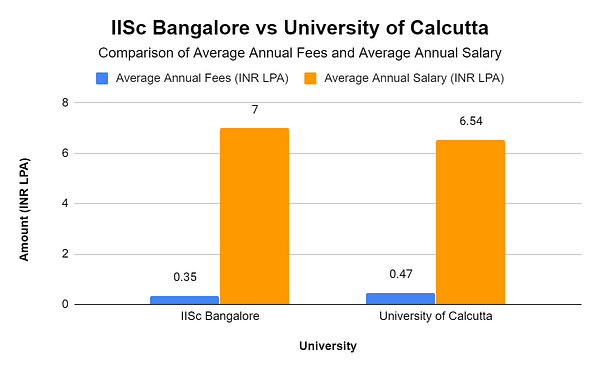
What is the Syllabus of PhD Neuroscience?
Although the PhD in Neuroscience program syllabus varies from college to college, it mostly consists of some common foundation courses that students can select based on their interests.
The common subjects that are included in the structured PhD Neuroscience syllabus are provided in the table given below:
| Subjects of Study |
|---|
| Research Methodology - Research methodology is the specific procedures or techniques used to identify, select, process, and analyze information about a topic. |
| Advanced study of Genetics and Molecular Biology - Genetics & Molecular Biology studies organisms at a molecular and cellular level, and helps us understand how molecules such as the DNA, RNA, proteins, lipids, and carbohydrates determine the behavior of living organisms. |
| Neuroanatomy and Developmental Neurobiology - Developmental neurobiology explores how a few early embryonic cells can transform into an intricately organized nervous system that controls an entire organism. |
| Neurochemistry - Deal with study of chemicals, including neurotransmitters and other molecules such as psychopharmaceuticals and neuropeptides, that control and influence the physiology of the nervous system. |
| Nanotechnology and Bioinformatics for Neuroscience - Study of nanotechnologies and bioinformatics that are vital for Neuroscience. |
| Dissertation/ Thesis |
| Seminar |
| Project |
PhD Neuroscience vs PhD Microbiology
PhD Neuroscience deals with the study of how the body fights infections whereas PhD Microbiology deals with the Microorganisms.
Check the list of Top PhD Microbiology Colleges in India.
Check the table below for more comparative details:
| Parameters | PhD Neuroscience | PhD Microbiology |
|---|---|---|
| Overview | PhD Neuroscience course offers students an integrated view of neuroscience combining it with the intricacies of research. | This program covers aspects of the Biochemistry, Physiology and Genetics of Microorganisms. This program is meant to prepare students for a prosperous career in the field of Microbiology. |
| Duration | 3 to 5 years | 3 to 5 years |
| Eligibility Criteria | Master’s degree in relevant discipline from a recognized university | Postgraduate degree with minimum 55% marks aggregate. |
| Exam Type | Annual/ Semester | Annual/ Semester |
| Admission Process | Entrance + Personal Interview | Entrance/ Merit-Based followed by Interview |
| Average Fees | INR 15,000 to 3,20,000 | INR 20,000 to 3,00,000 |
| Job Positions | Neural Engineer, Computational Neuroscientist, Biotechnologist, Database and Databank Manager, etc. | Laboratory Technologist, Medical Technologist, Laboratory Scientist, Lecturer, Technical Specialist etc. |
| Average Salary | INR 3,00,000 to 8,00,000 | INR 8,00,000 to 16,00,000 |
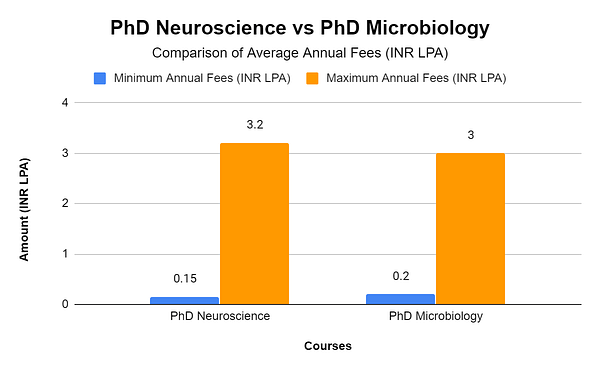
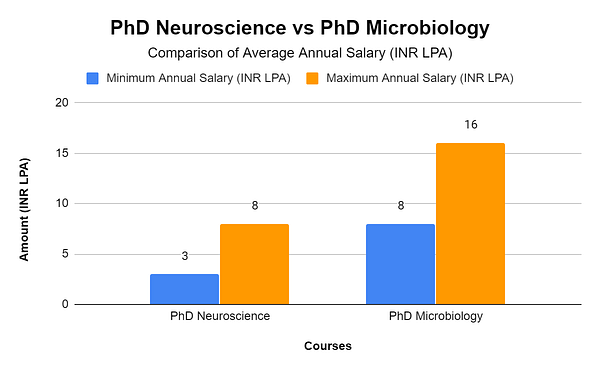
What are Job Prospects and Career Options after PhD Neuroscience?
After getting a degree in this field, a candidate can get a variety of jobs to choose from. It will be easy for them to work for the government and private organizations and many other sectors. They can also choose to teach as a professor or a lecturer in colleges or universities.
- PhD Neuroscience degree holders can find employment in the area of Public Health Sciences, Genetic Counselling Centres, Psychology Centres, Pharmaceutical Companies, Forensic Science Labs, Mental Health Sciences as well as in the position of professors at reputed universities and colleges.
- PhD degree holders in Neuroscience seek positions in various sectors as a Psychophysicist, Neurologist, Biotechnologist, Neuropathologist, Community Mental Health Worker, Researcher etc.
The table given below shows some of the most common PhD Neuroscience job profiles and career prospects after completing the course are as follows:
| Job Role | Job Description | Average Annual Salary |
|---|---|---|
| Neurophysiologist | The job role of a Neurologist includes curing various ailments related to the nervous system, diagnosing and monitoring the disorders. | INR 5,70,000 |
| Neural Engineer | The job of a Neural Engineer includes designing systems, artificial devices, and organs to replace body parts, and evaluate its safety and effectiveness. | INR 6,75,000 |
| Computational Neuroscientist | The job of a Computational Neuroscientist is to study the brain condition by monitoring the images on the computer. | INR 4,25,000 |
| Biotechnologist | The job role of a Biotechnologist includes conducting and monitoring experiments, analyzing, researching and developing procedures. | INR 6,00,000 |
| Neurologist | The job of a Neurologist is to diagnose and treat ailments related to the brain. | INR 4,88,000 |
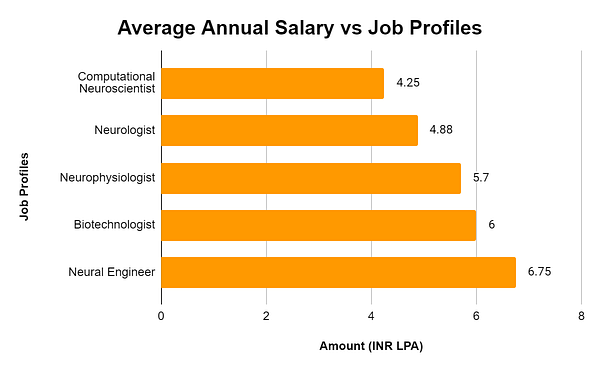
What are the Future Scopes of PhD Neuroscience?
PhD degree is a doctorate level degree and is the highest educational degree one can earn in the country. Generally one does not pursue further studies post completion of the PhD Neuroscience.
Employability is high and graduates are hired quickly upon completion of their degree in high pay job profiles. With this knowledge, there is no limit to learning and knowledge.
- Students may opt for teaching jobs in colleges/universities after this course and then clearing the UGC-NET exam required for becoming a permanent lecturer.
- They have many jobs in Genetic Counselling Centres, Psychology Centres, Pharmaceutical Companies, Forensic Science Labs etc. after completing this program.
- Students can also opt for a DSc (Doctor of Science) degree in any related field.
- After gaining adequate experience in the related field, Neurologists can work in govt. and private hospitals.
- Once you finish your PhD you can also be qualified for a lecturer post in Neuroscience and also to teach in colleges and universities with UGC scales.
PhD Neuroscience FAQs
Some of the most frequently asked questions pertaining to the PhD Neuroscience program are as follows:
Ques. How long does a PhD Neuroscience program take to complete?
Ques. How competitive are neuroscience PhD programs?
Ques. Is Neuroscience hard?
Ques. Is Neuroscience a good career?
Ques. Do you need to master calculus for Neuroscience?
Ques. Is Neuroscience harder than Psychology?
Ques. Which country is best for pursuing a program in Neuroscience?
Ques. What subjects do you need for Neuroscience?
Ques. What would Neuroscience fall under?
Ques. Do Neuroscientists work in hospitals?



![Christian Medical College - [CMC]](https://image-static.collegedunia.com/public/college_data/images/appImage/10343_CMC_New.jpg?h=150&w=320&mode=stretch)
![Indian Institute of Science - [IISc]](https://image-static.collegedunia.com/public/college_data/images/appImage/1562240371cover.jpg?h=150&w=320&mode=stretch)
![Aligarh Muslim University - [AMU]](https://image-static.collegedunia.com/public/college_data/images/appImage/1504180374cover.jpg?h=150&w=320&mode=stretch)



![Manipal Academy of Higher Education - [MAHE]](https://image-static.collegedunia.com/public/college_data/images/appImage/25617_MANIPAL.jpg?h=150&w=320&mode=stretch)


Comments